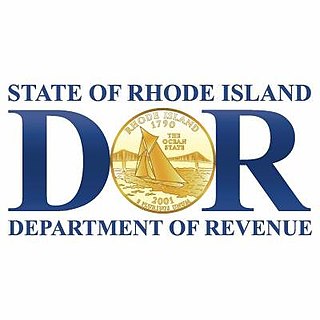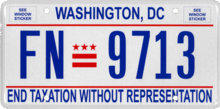
A department of motor vehicles (DMV) is a government agency that administers motor vehicle registration and driver licensing. In countries with federal states such as in North America, these agencies are generally administered by subnational entities governments, while in unitary states such as many of those in Europe, DMVs are organized nationally by the central government.

A vanity plate or personalized plate ; prestige plate, private number plate, cherished plate or personalised registration ; personalised plate or custom plate is a special type of vehicle registration plate on an automobile or other vehicle. The owner of the vehicle pays extra money to have their own choice of numbers or letters, usually portraying a recognizable phrase, slogan, or abbreviation, on their plate. Sales of vanity plates are often a significant source of revenue for North American provincial and state licensing agencies. In some jurisdictions, such as British Columbia, vanity plates have a different color scheme and design.

The Pennsylvania Department of Transportation (PennDOT) oversees transportation issues in the Commonwealth of Pennsylvania. The administrator of PennDOT is the Pennsylvania Secretary of Transportation, Michael B. Carroll. PennDOT supports nearly 40,000 miles (64,000 km) of state roads and highways, about 25,000 bridges, and new roadway construction with the exception of the Pennsylvania Turnpike Commission.
The American Association of Motor Vehicle Administrators (AAMVA) is a 501(c)(3) nonprofit trade association based in Arlington, Virginia that operates in the United States and Canada on behalf of motor vehicle licensing and registration agencies. The AAMVA is primarily involved with motor vehicle administration and law enforcement through production of guidelines, model legislation, and white paper reports which it disseminates to its members. The membership of the organization consists of what the AAMVA calls jurisdictional members, these being US states and Canadian territories; and associate members, which include corporations, nonprofits, local governments, and individual law enforcement agencies.

The Real ID Act of 2005 is an Act of Congress that establishes requirements that driver licenses and identification cards issued by U.S. states and territories must satisfy to be accepted for accessing federal government facilities, nuclear power plants, and for boarding airline flights in the United States. The requirements include verification of the personal information presented when applying for the identification document, security features on the document, and electronic sharing of databases between states. The act also made various modifications to U.S. immigration law regarding asylum, border security, deportation, and specific work visas.

In the United States, vehicle registration plates, known as license plates, are issued by a department of motor vehicles, an agency of the state or territorial government, or in the case of the District of Columbia, the district government. Some Native American tribes also issue plates. The U.S. federal government issues plates only for its own vehicle fleet and for vehicles owned by foreign diplomats. Until the 1980s, diplomatic plates were issued by the state in which the consulate or embassy was located.
The National Driver Register (NDR) is a computerized database of information about United States drivers who have had their driver's licenses revoked or suspended, or who have been convicted of serious traffic violations, such as driving under the influence or drugs or alcohol. The records are added and maintained and deleted by the motor vehicle agency (MVA) of the state that convicted the driver or withdrew the driver's license.

The New Jersey Motor Vehicle Commission is a governmental agency of the U.S. state of New Jersey. The equivalent of the Department of Motor Vehicles in other states, it is responsible for titling, registering and inspecting automobiles, and issuing driver's licenses.

The California Department of Motor Vehicles (DMV) is the state agency that registers motor vehicles and boats and issues driver licenses in the U.S. state of California. It regulates new car dealers, commercial cargo carriers, private driving schools, and private traffic schools. The DMV works with the superior courts of California to promptly record convictions against driver licenses, and initiates administrative proceedings before its own administrative law judges to suspend or revoke licenses when drivers accumulate excessive convictions. It issues California license plates and driver's licenses. The DMV also issues identification cards to people who request one.

In the United States, driver's licenses are issued by each individual state, territory, and the District of Columbia. Drivers are normally required to obtain a license from their state of residence. All states of the United States and provinces and territories of Canada recognize each other's licenses for non-resident age requirements. There are also licenses for motorcycle use. Generally, a minimum age of 15 is required to apply for a non-commercial driver license, and 25 for commercial licenses which drivers must have to operate vehicles that are too heavy for a non-commercial licensed driver or vehicles with at least 16 passengers or containing hazardous materials that require placards. A state may also suspend an individual's driving privilege within its borders for traffic violations. Many states share a common system of license classes, with some exceptions, e.g. commercial license classes are standardized by federal regulation at 49 CFR 383. Many driving permits and ID cards display small digits next to each data field. This is required by the American Association of Motor Vehicle Administrators' design standard and has been adopted by many US states. The AAMVA provides a standard for the design of driving permits and identification cards issued by its member jurisdictions, which include all 50 US states, the District of Columbia, and Canadian territories and provinces. The newest card design standard released is the 2020 AAMVA DL/ID Card Design Standard (CDS). The AAMVA standard generally follows part 1 and part 2 of ISO/IEC 18013-1. The ISO standard in turn specifies requirements for a card that is aligned with the UN Conventions on Road Traffic, namely the Geneva Convention on Road Traffic and the Vienna Convention on Road Traffic.
The New York State Department of Motor Vehicles is the department of the New York state government responsible for vehicle registration, vehicle inspections, driver's licenses, learner's permits, photo ID cards, and adjudicating traffic violations. Its regulations are compiled in title 15 of the New York Codes, Rules and Regulations.

The U.S. state of Texas first required its residents to register their motor vehicles in 1907. Registrants provided their own license plates for display, with serial numbers assigned by their county of residence, until the state began to issue plates in 1917.

The U.S. state of Wisconsin first required its residents to register their motor vehicles and display license plates in 1905. Plates are currently issued by the Wisconsin Department of Transportation (WisDOT) through its Division of Motor Vehicles. Front and rear plates are required for most classes of vehicles, while only rear plates are required for motorcycles and trailers.

The U.S. federal district of Washington, D.C., first required its residents to register their motor vehicles in 1903. Registrants provided their own license plates for display until 1907, when the district began to issue plates. Plates are issued by the District of Columbia Department of Motor Vehicles. Front and rear plates are required for most classes of vehicles, while only rear plates are required for motorcycles and trailers.

The District of Columbia has a mayor–council government that operates under Article One of the United States Constitution and the District of Columbia Home Rule Act. The Home Rule Act devolves certain powers of the United States Congress to the local government, which consists of a mayor and a 13-member council. However, Congress retains the right to review and overturn laws created by the council and intervene in local affairs.

The Vermont Department of Motor Vehicles (DMV) is the governmental agency responsible for registering and inspecting automobiles and other motor vehicles as well as licensing drivers in the U.S. state of Vermont.

The Florida Department of Highway Safety and Motor Vehicles (FLHSMV) is a statutorily established cabinet agency of Florida government. In 1969, under Governor Claude Kirk, the Department of Motor Vehicles and the Department of Public Safety were merged forming the Department of Highway Safety and Motor Vehicles. The agency head of FLHSMV is the governor and Cabinet, with authority delegated to the executive director. The executive director has functional responsibility for directing, monitoring, supervising, coordinating, and administering all activities of the department. The executive director ensures that FLHSMV's mission and objectives are being followed, pursuant to the Florida Statutes and Florida Administrative Code. The department provides oversight and services in partnership with the various 67 Florida county tax collectors for the issuance of driver licenses, the Florida drivers license handbook registrations and titling of automobiles, trailers, boats, and mobile homes. Florida residents who are at least 15 years old can obtain a learner license after meeting the requirements.

A driver's license, driving licence, or driving permit is a legal authorization, or the official document confirming such an authorization, for a specific individual to operate one or more types of motorized vehicles—such as motorcycles, cars, trucks, or buses—on a public road. Such licenses are often plastic and the size of a credit card.

The Rhode Island Department of Revenue (RIDOR) is a state agency of Rhode Island responsible for collection of taxes and distribution of state revenue, as well as administration of state laws governing driver licensing, and motor vehicle sale and registration. The current Director of the Department of Revenue is Guillermo Tello, appointed by Governor Dan McKee on May 4, 2021.
The Washington State Department of Licensing (DOL) is a department of the Washington state government that administers vehicle and vessel registration and issues driver's licenses. It also regulates licensing for certain professions, including architects, cosmetologists, geologists, private investigators, real estate brokers, and security guards. The agency also maintains a database of firearms transactions and ownership that is used by law enforcement in the state.


















